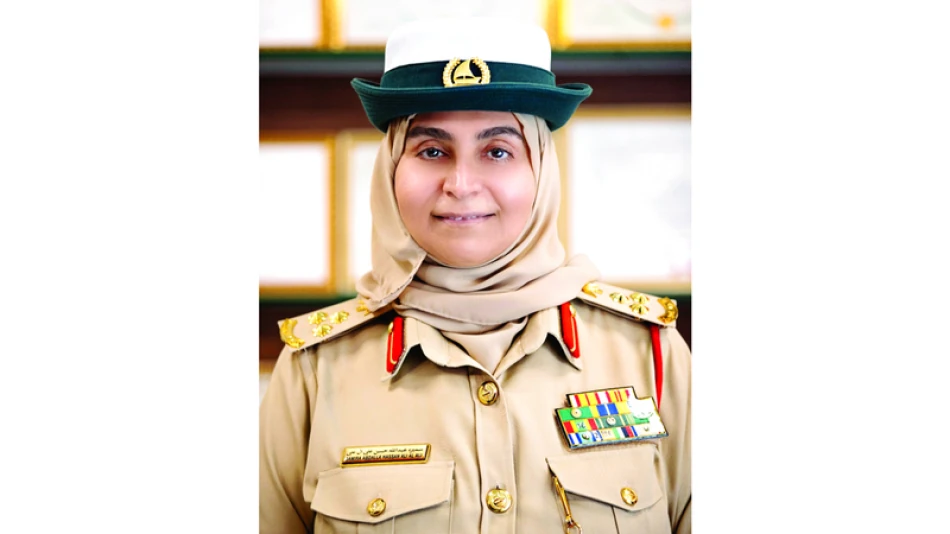
Trailblazing Female Officer Soars: Smera Al Ali on Excelling in the Military and Her Promotion's Greater Responsibility
Dubai Police Breaks Glass Ceiling as First Female Brigadier Saves $31 Million Through Insurance Innovation
Brigadier Samira Abdullah Al Ali has shattered a 68-year precedent by becoming the first woman to reach the rank of Brigadier in Dubai Police history since the force's establishment in 1956. Beyond the symbolic milestone, Al Ali has delivered tangible results, generating over AED 114 million ($31 million) in savings through revolutionary insurance system reforms that could reshape how security agencies worldwide manage risk and resources.
A Strategic Investment in Women's Leadership
Al Ali's promotion, ordered by Sheikh Mohammed bin Rashid Al Maktoum in July 2024, represents more than ceremonial progress. Her three-decade career trajectory from a small insurance desk to heading Dubai Police's comprehensive insurance operations demonstrates the UAE's strategic approach to leveraging talent regardless of gender—a model increasingly adopted by progressive nations seeking competitive advantages in security and governance.
The timing is significant. As Gulf states diversify their economies and modernize institutions, integrating women into senior security roles provides both legitimacy and operational benefits. Singapore, Switzerland, and Nordic countries have demonstrated that gender-diverse security leadership often correlates with improved efficiency and innovation—exactly what Al Ali's financial results suggest.
Financial Innovation in Security Operations
Quantifiable Impact Beyond Symbolism
Al Ali's insurance department transformation generated savings through multiple channels: AED 24.2 million in government spending optimization (2017-2024), AED 41.8 million through improved claims settlement practices (2018-2025), and AED 7.2 million in resource sustainability measures—achieving an 18% improvement in economic resource efficiency.
These figures matter because security agencies globally struggle with budget constraints while facing expanding technological demands. Al Ali's approach—treating insurance as a strategic asset rather than administrative overhead—offers a replicable model for police forces worldwide grappling with similar pressures.
Expanding Coverage Beyond Traditional Boundaries
Under Al Ali's leadership, Dubai Police's insurance portfolio evolved from basic vehicle and building coverage to comprehensive protection including drones, police horses, K-9 units, marine vessels, medical malpractice, and volunteer worker injuries. This expansion reflects the increasingly complex operational environment modern police forces navigate.
The innovation extends to risk assessment. Al Ali's team developed internal analytical capabilities, moving beyond simple insurance brokerage to sophisticated risk management—positioning Dubai Police ahead of many international counterparts still relying on external consultants.
Preparing for Autonomous Vehicle Challenges
Perhaps most significantly, Al Ali revealed ongoing legislative work to develop insurance coverage for autonomous vehicles—a challenge that has puzzled regulators from California to Germany. Dubai's proactive approach could establish the emirate as a testing ground for autonomous vehicle insurance frameworks, potentially attracting automotive and technology companies seeking regulatory clarity.
This positions Dubai strategically in the global race for autonomous vehicle adoption. While other jurisdictions debate liability frameworks, Dubai appears ready to offer practical solutions—a competitive advantage in attracting investment and innovation.
Regional Leadership Model
Al Ali's success occurs within the UAE's broader women's empowerment strategy, which has produced female ministers, judges, and military pilots. However, her achievement in security leadership—traditionally among the most male-dominated sectors—sends a particularly strong signal to other Gulf states and developing nations.
The economic results validate this approach. When institutions can demonstrate that diversity initiatives produce measurable financial benefits, they become easier to replicate and scale. Al Ali's AED 114 million in savings provides concrete evidence for similar programs elsewhere.
Implications for Modern Policing
Technology Integration and Risk Management
Al Ali's emphasis on comprehensive insurance coverage for emerging technologies—drones, smart systems, AI applications—reflects modern policing's technological evolution. Her "Safe Driving Stars" initiative, which rewards accident-free drivers, demonstrates data-driven approaches to risk reduction that could inform police fleet management globally.
The five-year insurance contracts her team negotiated suggest confidence in their risk assessment capabilities—a significant achievement in an industry typically favoring shorter terms due to uncertainty.
Institutional Memory and Knowledge Transfer
With 163 training sessions attended, 16 workshops delivered, and 225 development proposals submitted, Al Ali represents institutional knowledge accumulation that extends far beyond individual achievement. Her 19 intellectual property registrations, including trademarked safety initiatives, create lasting organizational assets.
This knowledge-building approach offers lessons for security agencies worldwide: investing in specialized expertise within core operations, rather than outsourcing everything, can generate significant long-term value.
Looking Forward: Sustainable Security Innovation
Al Ali's trajectory from a two-person office in 1994 to leading a comprehensive insurance operation illustrates how sustained investment in human capital and institutional development can produce exponential returns. Her success provides a template for security modernization that combines operational efficiency with social progress.
As autonomous vehicles, AI systems, and other emerging technologies reshape security operations globally, Dubai Police's proactive insurance framework development could establish international standards. For investors and technology companies, this suggests Dubai may offer more predictable regulatory environments for security technology deployment than many alternatives.
The broader lesson extends beyond policing: institutions willing to break traditional barriers while maintaining rigorous performance standards can achieve both symbolic victories and substantial operational improvements. Al Ali's story demonstrates that diversity initiatives, when properly implemented and measured, can deliver returns that justify investment on purely economic grounds.
Most Viewed News

 Sara Khaled
Sara Khaled






